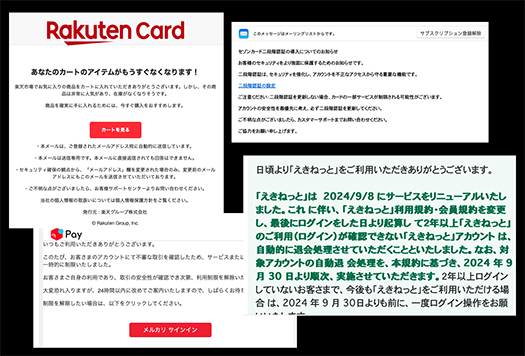
日本語言語と社会の変遷というものに興味を持って、歴史などをみる視点を心がけて来ているのですが、やはり日本社会は過去に何度も大きな「変革期」を経験してきていると思えます。
相次いだ大陸からの集団移住の動きなどから考えると、列島社会では多様でバラバラな言語が存在したという説も確率が高い。
多様な母集団が数次にわたって「渡来」してきて形成されたという日本社会実態という意味ではやはり古代における「日本語の創造」過程、記紀編纂という変動期は非常に大きなインパクトだったことは間違いない。伝統的に文字を持たなかった社会で、国家というものの成り立ちを「正史」として創造する必要性に迫られて、それまでの列島社会の社会の流れを、それも漢字という輸入ツールを使って表現した作業というのは、気が遠くなる思い。話し言葉での原日本語的な助詞や助動詞などに対して特定の漢字を使っての用途特定をするという離れ業でようやく実現したように思われる。
やがてそれが漢字という表意文字に対抗した「ひらがな・カタカナ」という表音文字が創出され、独特の日本的共通言語ツールが形成されて行った。
そういう大きな変動インパクトを現代で考えると、やはり「IT化」ということがきわめて大きいと思う。話し言葉、書き言葉と同様に、パソコンやスマホでのWEBサイトといった「コミュニケーション」領域がどんどんと拡大している。高齢化と少子化・核家族化の同時進行で、現代では社会的意思決定主体が「個」に限定されることが増えてきて、勢い、IT活用型の社会的意思確認・意思表示という機会がどんどん拡大してきている。
図はわたしのパソコンメールに毎日毎日送られてくる無数の「詐欺メール」の一例。
まぁ「なにこれ、なんかヘン」と気付けているけれど、こういった類いのモノにでも欺されてしまうという事例も報告されている。言ってみれば「IT認知」、IT世界での常識的判断力に対して、さまざまな詐欺手法が開発されて「個人」を攻撃することが常態化してきつつある。
当然、こうした攻撃への「耐性」も育ってきてはいるけれど、「IT認知」障害というものは年齢層によっても、社会との関わりレベルによっても社会成員によって程度差は生じることだろう。たとえ個人が欺されても近親者がいっしょにいれば最低限の「防御」は可能だろうけれど、とくに単身高齢者は、格好の攻撃対象になりやすいことが考えられる。
孤立化と「IT認知」の格差、課題はまさに現代的だと思う。
English version⬇
Modern Frauds Attacking “IT Awareness”
As computers and smartphones become social infrastructure, they are becoming an important aspect of communication. Scammers are exploiting that common sense level gap. …
I have always been interested in Japanese language and social transition, and have always tried to look at history from a historical perspective, but it seems to me that Japanese society has undergone several major “periods of change” in the past.
In light of the successive mass migrations from the continent, it is highly probable that a variety of different languages existed in the archipelago society.
In terms of the reality of Japanese society, which was formed through the “arrival” of diverse populations over several generations, the process of “creation of the Japanese language” in ancient times and the period of change that led to the compilation of the Chronicles of Japan undoubtedly had an extremely large impact. In a society that traditionally had no written language, the need to create an “authentic history” of the formation of the nation, and to express the social flow of the archipelago’s society up to that time using the imported tool of kanji, was a daunting task. It seems that the work was finally realized through the feat of specifying the use of specific kanji for proto-Japanese particles and auxiliary verbs in spoken Japanese.
Eventually, hiragana and katakana were created as phonetic counterparts to the ideographs of kanji, and a unique Japanese lingua franca was formed.
When we consider the impact of such a major change in the modern world, the “shift to information technology” is of course extremely significant. As well as spoken and written language, the “communication” sphere is expanding rapidly through websites on PCs and smartphones. With the simultaneous aging of society, declining birthrate, and nuclear families, social decision-making is increasingly limited to the individual, and opportunities for social confirmation and expression of intentions using IT are expanding rapidly.
The figure below is an example of the countless “scam e-mails” that are sent to my computer e-mail every day.
I am aware of it, but there have been reports of people being deceived by these kinds of things. Various fraudulent methods have been developed to attack “individuals” against their “IT cognition,” or common sense judgment in the IT world.
Naturally, people have developed a “tolerance” to such attacks, but the degree of “IT cognition” disorder may vary among different age groups, depending on the level of social interaction, and among different members of society. Even if an individual is deceived, he or she may be able to defend himself or herself at least as long as close relatives are with him or her, but the elderly alone may be especially vulnerable to attacks.
The issue of isolation and the disparity in “IT awareness” is a very contemporary one.
Posted on 9月 9th, 2024 by 三木 奎吾
Filed under: 日本社会・文化研究







コメントを投稿
「※誹謗中傷や、悪意のある書き込み、営利目的などのコメントを防ぐために、投稿された全てのコメントは一時的に保留されますのでご了承ください。」
You must be logged in to post a comment.